人教新目标(Go for it)版八年级下Unit 4 Why don't you talk to your parents? Section A (GF-4c)课件(31张ppt 无素材)
文档属性
| 名称 | 人教新目标(Go for it)版八年级下Unit 4 Why don't you talk to your parents? Section A (GF-4c)课件(31张ppt 无素材) | 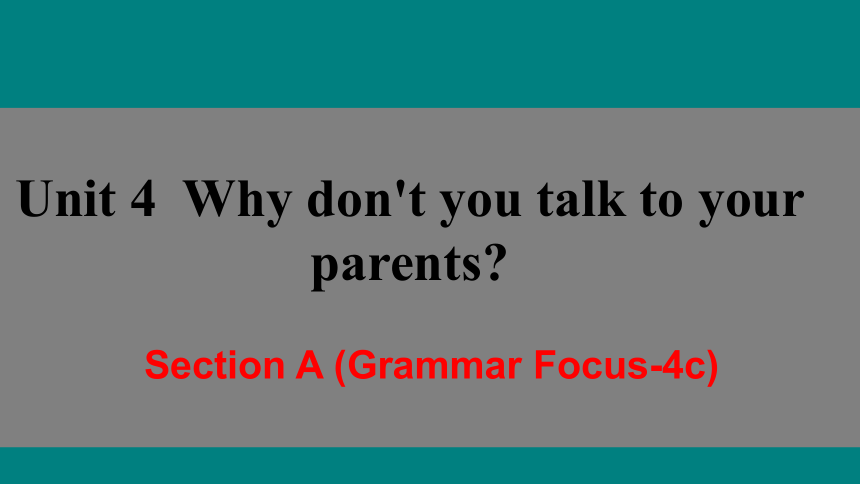 | |
| 格式 | pptx | ||
| 文件大小 | 2.5MB | ||
| 资源类型 | 教案 | ||
| 版本资源 | 人教新目标(Go for it)版 | ||
| 科目 | 英语 | ||
| 更新时间 | 2021-12-14 23:58:10 | ||
图片预览

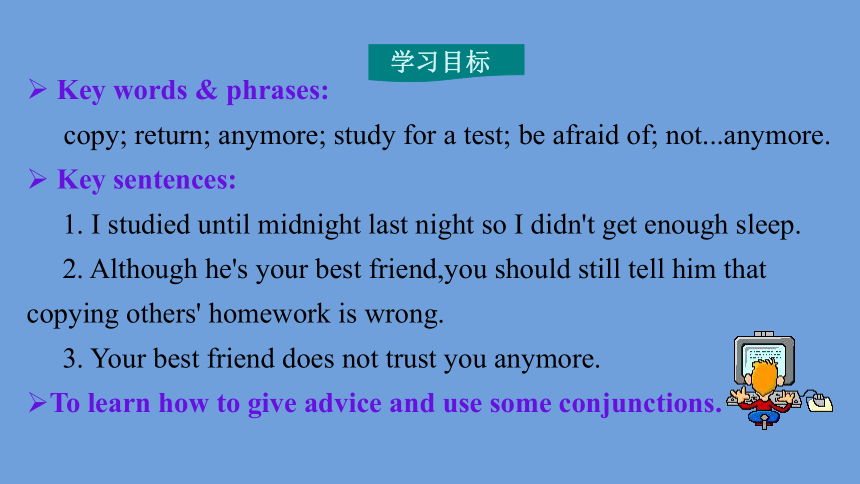
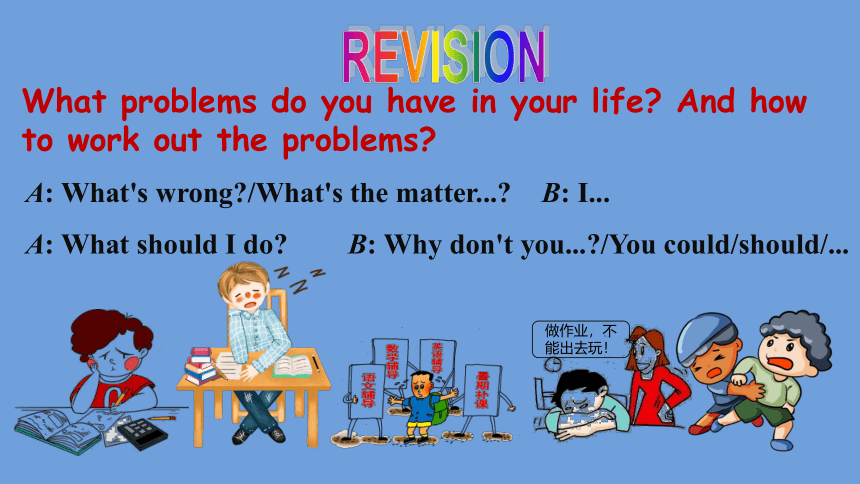
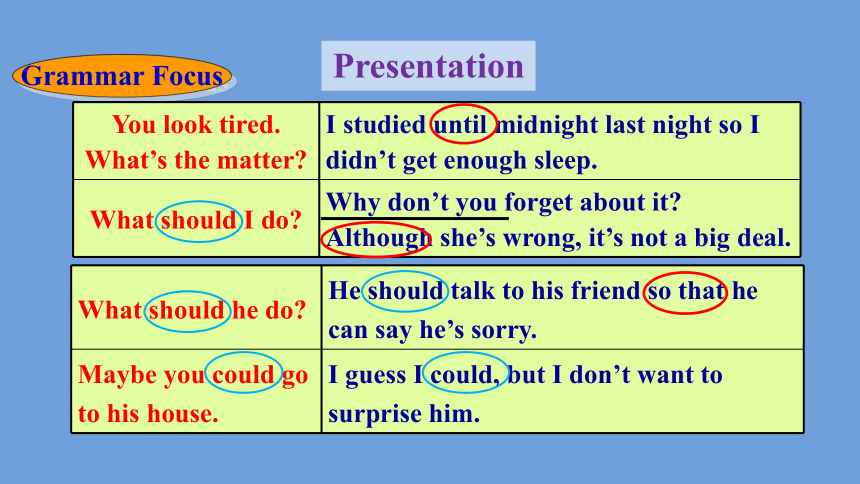



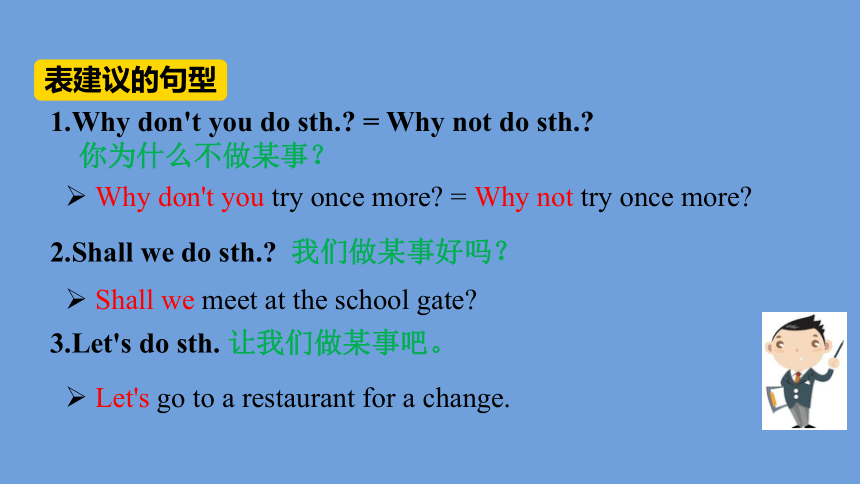
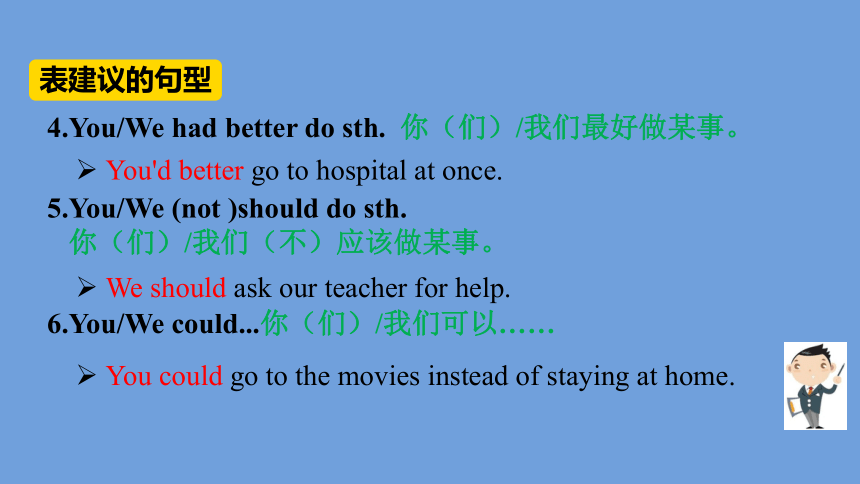
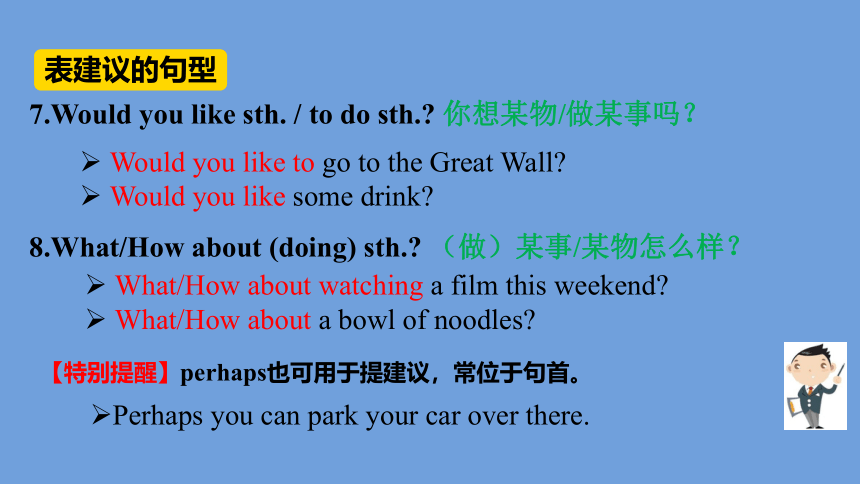


文档简介
(共31张PPT)
Section A (Grammar Focus-4c)
Unit 4 Why don't you talk to your parents
学习目标
Key words & phrases:
copy; return; anymore; study for a test; be afraid of; not...anymore.
Key sentences:
1. I studied until midnight last night so I didn't get enough sleep.
2. Although he's your best friend,you should still tell him that copying others' homework is wrong.
3. Your best friend does not trust you anymore.
To learn how to give advice and use some conjunctions.
REVISION
A: What's wrong /What's the matter... B: I...
A: What should I do B: Why don't you... /You could/should/...
What problems do you have in your life And how to work out the problems
做作业,不能出去玩!
Grammar Focus
You look tired. What’s the matter I studied until midnight last night so I didn’t get enough sleep.
What should I do Why don’t you forget about it Although she’s wrong, it’s not a big deal.
What should he do He should talk to his friend so that he can say he’s sorry.
Maybe you could go to his house. I guess I could, but I don’t want to surprise him.
Presentation
Grammar
until作连词,意为“直到”,引导时间状语从句。
I'll stay here until you come back.
1. 主句是肯定句时,其谓语用延续性动词,强调主句的动作或状态一直持续到从句的动作发生时为止,译成“直到……为止”。
We can't get off the bus until it stops.
We didn't start our discussion until he arrived.
2.主句是否定句时,其谓语用非延续性动词,强调主句的动作在从句的动作发生之后才开始,一般译成“直到……才……”。
until 引导的时间状语从句
so that 引导的目的状语从句
so that意为“为了,以便”,引导目的状语从句,相当于in order that,从句中多含有can, could, may, might等情态动词。
I took a taxi so that I could get there earlier.
The movie was boring so that half of the audience was asleep.
【拓展延伸】so that还可引导结果状语从句,意为“因此;所以”,此时从句中通常不含情态动词。
although引导的让步状语从句
although意为“尽管;然而”,引导让步状语从句,相当于though。
Although we are neighbors, I don't know them well.
Although she was in poor health, she continued to carry out her duties.
Although/Though he was badly ill, he still went to school.
【注意】although或though不能与but用在同一个句子中,但可以与yet, still同时使用。
表建议的句型
1.Why don't you do sth. = Why not do sth.
你为什么不做某事?
Why don't you try once more = Why not try once more
2.Shall we do sth. 我们做某事好吗?
Shall we meet at the school gate
3.Let's do sth. 让我们做某事吧。
Let's go to a restaurant for a change.
4.You/We had better do sth. 你(们)/我们最好做某事。
You'd better go to hospital at once.
5.You/We (not )should do sth.
你(们)/我们(不)应该做某事。
We should ask our teacher for help.
6.You/We could...你(们)/我们可以……
You could go to the movies instead of staying at home.
表建议的句型
7.Would you like sth. / to do sth. 你想某物/做某事吗?
Would you like to go to the Great Wall
Would you like some drink
8.What/How about (doing) sth. (做)某事/某物怎么样?
What/How about watching a film this weekend
What/How about a bowl of noodles
【特别提醒】perhaps也可用于提建议,常位于句首。
Perhaps you can park your car over there.
表建议的句型
回答建议的句型
肯定回答
·Good idea. / That's a good idea. 好主意。
·OK. / All right. / Great. 好。
·Yes, please. / I'd love / like to. 好的。/我愿意。
·Sounds good / great. 听起来不错。
·No problem. 没问题。
·Sure. / Of course. / Certainly. 当然可以。
·I can't agree more. 我非常同意。
·Yes, I think so. 好的,我也这样认为。
否定回答
回答建议的句型
·I don't think so. 我不这样认为。
·Sorry, I can't. 对不起,我不能。
·I'd love / like to, but... 我很乐意,但是……
·I'm afraid... 我恐怕……
·What a pity! I have to... 真遗憾!我不得不……
4a
Fill in the blanks with although, so that or until.
1. A: What’s wrong
B: My sister borrows my clothes without asking.
What should I do
A: Well, you could tell her that this makes you angry ________
she’ll ask you next time.
2. A: I don’t have any friends at my new school.
What should I do
B: __________ you don’t have any now, you will soon make
some.
so that
Although
3. A: I’m worried about my school grades. What’s your advice
B: You shouldn’t wait _______ the last minute to study for a
test.
4. A: Mike is my best friend, but he always copies
my homework. What should I do
B: ____________ he’s your best friend, you should still tell
him that copying others’ homework is wrong.
until
Although
4b
Write one piece of advice for each problem. Then compare your advice with your partner's and decide whether the advice is good or bad.
1. I’m very shy.
Advice:
2. My sister and I fight all the time.
Advice:
You should practice speaking in front of class more.
You could try to do more fun things with her so that you will like each other better and not fight so often.
3. My sister spends all evening on the phone.
Advice:
4. My cousin borrows my things without returning them.
Advice:
5. My parents won't let me have a pet.
Advice:
Maybe you could talk to her about it .
You could tell him that this makes you unhappy so that he will return them soon next time.
You should communicate with them.
4c
Choose one of the problems and ask your classmates for advice. Decide which classmate has the best advice.
You left your homework at home.
Your best friend is more popular than you.
You are afraid of speaking in front of people.
Your best friend does not trust you anymore.
Your parents always argue.
Problems
not...anymore 不再……
My best friend is more popular than me. I want to be like him. What should I do
You could try to be friendlier.
You should just be yourself.
Group work
The group collects advice. The group leader reports to the class, and selects the best advice.
Language points
1. My cousin borrows my things without returning them.
ruturn在此处作及物动词,意为“归还”,相当于give sth. back。return sth. to sb. = return sb. sth., 意为“把某物还给某人”。
ruturn v. 归还;回来;返回
I'm going to return this book to Tom.
=I'm going to return Tom his book.
【拓展延伸】return还可用作不及物动词,意为“回来;返回”,相当于come back。
返回某地
return+地点副词
return to+地点名词
He returned to the factory.
2. You are afraid of speaking in front of people.
afraid在句中一般作表语,不作定语,其主要用法有:
afraid adj. 害怕;畏惧
·be afraid of sb./sth. 害怕某人/某物
·be afraid of doing sth. 害怕做某事 (强调担心会发生, 但实际未必发生)
·be afraid to do sth. 不敢做某事 (强调不敢去做某事)
·be afraid+ that从句 担心……
Never be afraid of difficulties and never give up hope.
Are you afraid of going to the dentist
He was afraid to travel by plane.
I'm afraid that I will fall into the hole.
3. Your best friend doesn't trust you anymore.
not...anymore 不再……
主要用来表示数量和程度,常修饰短暂性动词,指某个动作不再重复发生,相当于no more。
My father didn't smoke anymore.= My father no more smoked.
【拓展延伸】 not... any longer主要用来表示时间及距离上的“不再” ,一般修饰延续性动词,表示某个动作或状态不再延续下去,相当于no longer。
She isn't a student any longer.= She is no longer a student.
Exercises
一、单项选择
1.—Why not hold a Chinese Poetry Competition to welcome our school's 70th birthday
—_____ Let's make a plan together in our group.
A. That's all right. B. Yes, please.
C. Good idea. D. Never mind.
2.—I feel stressed from time to time. Could you give me some advice
—____ sharing your worries with your paretns
A. Why don't you B. How about
C. Why not D. Would you like
C
B
3.—Susan, would you like another cake
—_____. I'm full.
A. Yes, please B. My pleasure C. No, thanks D. Not at all
4.—It's nearly lunchtime. How about having some noodles and dumplings
—_____.
A.You're welcome B.That's all right
C. That's nice of you D.That sounds good
C
D
5.The old man leads a simple life, ____ he has a lot of wealth.
A. although B. so C. unless D. because
6.—Lucy, you can't use the phone _____ we are far from the gas (天然气) station.
—OK, I won't do that again.
A. after B. when C. though D. until
A
D
7. _____ it's a public holiday today, some firefighters in our city are still on duty.
A. Although B. Once C. If D.Unless
8.—Jim, let's go out to play basketball.
—Oh, I won't do that _____ I finish my homework.
A. if B. until C. because D. since
9.You could climb the mountains _____ you can keep healthy.
A. until B. so that C. as soon as D. in order to
A
B
B
1.你为什么不和你父母谈谈
_____ _____ _____ talk to your parents
2.你应该邀请她参加你的生日聚会。
You _______ invite her to your birthday party.
3.虽然我尽力了,但考试还是没及格。
_________ I tried my best, I failed the exam.
4.老师大声说话,以便所有的学生都能听到。
The teacher spoke loudly ____ _____all the students could hear him.
二、完成句子
Why don't you
Although
should
so that
Homework
Preview the new words and phrases in Section B(1a-1e).
Do the exercises in students’ book.
Thank you!
Section A (Grammar Focus-4c)
Unit 4 Why don't you talk to your parents
学习目标
Key words & phrases:
copy; return; anymore; study for a test; be afraid of; not...anymore.
Key sentences:
1. I studied until midnight last night so I didn't get enough sleep.
2. Although he's your best friend,you should still tell him that copying others' homework is wrong.
3. Your best friend does not trust you anymore.
To learn how to give advice and use some conjunctions.
REVISION
A: What's wrong /What's the matter... B: I...
A: What should I do B: Why don't you... /You could/should/...
What problems do you have in your life And how to work out the problems
做作业,不能出去玩!
Grammar Focus
You look tired. What’s the matter I studied until midnight last night so I didn’t get enough sleep.
What should I do Why don’t you forget about it Although she’s wrong, it’s not a big deal.
What should he do He should talk to his friend so that he can say he’s sorry.
Maybe you could go to his house. I guess I could, but I don’t want to surprise him.
Presentation
Grammar
until作连词,意为“直到”,引导时间状语从句。
I'll stay here until you come back.
1. 主句是肯定句时,其谓语用延续性动词,强调主句的动作或状态一直持续到从句的动作发生时为止,译成“直到……为止”。
We can't get off the bus until it stops.
We didn't start our discussion until he arrived.
2.主句是否定句时,其谓语用非延续性动词,强调主句的动作在从句的动作发生之后才开始,一般译成“直到……才……”。
until 引导的时间状语从句
so that 引导的目的状语从句
so that意为“为了,以便”,引导目的状语从句,相当于in order that,从句中多含有can, could, may, might等情态动词。
I took a taxi so that I could get there earlier.
The movie was boring so that half of the audience was asleep.
【拓展延伸】so that还可引导结果状语从句,意为“因此;所以”,此时从句中通常不含情态动词。
although引导的让步状语从句
although意为“尽管;然而”,引导让步状语从句,相当于though。
Although we are neighbors, I don't know them well.
Although she was in poor health, she continued to carry out her duties.
Although/Though he was badly ill, he still went to school.
【注意】although或though不能与but用在同一个句子中,但可以与yet, still同时使用。
表建议的句型
1.Why don't you do sth. = Why not do sth.
你为什么不做某事?
Why don't you try once more = Why not try once more
2.Shall we do sth. 我们做某事好吗?
Shall we meet at the school gate
3.Let's do sth. 让我们做某事吧。
Let's go to a restaurant for a change.
4.You/We had better do sth. 你(们)/我们最好做某事。
You'd better go to hospital at once.
5.You/We (not )should do sth.
你(们)/我们(不)应该做某事。
We should ask our teacher for help.
6.You/We could...你(们)/我们可以……
You could go to the movies instead of staying at home.
表建议的句型
7.Would you like sth. / to do sth. 你想某物/做某事吗?
Would you like to go to the Great Wall
Would you like some drink
8.What/How about (doing) sth. (做)某事/某物怎么样?
What/How about watching a film this weekend
What/How about a bowl of noodles
【特别提醒】perhaps也可用于提建议,常位于句首。
Perhaps you can park your car over there.
表建议的句型
回答建议的句型
肯定回答
·Good idea. / That's a good idea. 好主意。
·OK. / All right. / Great. 好。
·Yes, please. / I'd love / like to. 好的。/我愿意。
·Sounds good / great. 听起来不错。
·No problem. 没问题。
·Sure. / Of course. / Certainly. 当然可以。
·I can't agree more. 我非常同意。
·Yes, I think so. 好的,我也这样认为。
否定回答
回答建议的句型
·I don't think so. 我不这样认为。
·Sorry, I can't. 对不起,我不能。
·I'd love / like to, but... 我很乐意,但是……
·I'm afraid... 我恐怕……
·What a pity! I have to... 真遗憾!我不得不……
4a
Fill in the blanks with although, so that or until.
1. A: What’s wrong
B: My sister borrows my clothes without asking.
What should I do
A: Well, you could tell her that this makes you angry ________
she’ll ask you next time.
2. A: I don’t have any friends at my new school.
What should I do
B: __________ you don’t have any now, you will soon make
some.
so that
Although
3. A: I’m worried about my school grades. What’s your advice
B: You shouldn’t wait _______ the last minute to study for a
test.
4. A: Mike is my best friend, but he always copies
my homework. What should I do
B: ____________ he’s your best friend, you should still tell
him that copying others’ homework is wrong.
until
Although
4b
Write one piece of advice for each problem. Then compare your advice with your partner's and decide whether the advice is good or bad.
1. I’m very shy.
Advice:
2. My sister and I fight all the time.
Advice:
You should practice speaking in front of class more.
You could try to do more fun things with her so that you will like each other better and not fight so often.
3. My sister spends all evening on the phone.
Advice:
4. My cousin borrows my things without returning them.
Advice:
5. My parents won't let me have a pet.
Advice:
Maybe you could talk to her about it .
You could tell him that this makes you unhappy so that he will return them soon next time.
You should communicate with them.
4c
Choose one of the problems and ask your classmates for advice. Decide which classmate has the best advice.
You left your homework at home.
Your best friend is more popular than you.
You are afraid of speaking in front of people.
Your best friend does not trust you anymore.
Your parents always argue.
Problems
not...anymore 不再……
My best friend is more popular than me. I want to be like him. What should I do
You could try to be friendlier.
You should just be yourself.
Group work
The group collects advice. The group leader reports to the class, and selects the best advice.
Language points
1. My cousin borrows my things without returning them.
ruturn在此处作及物动词,意为“归还”,相当于give sth. back。return sth. to sb. = return sb. sth., 意为“把某物还给某人”。
ruturn v. 归还;回来;返回
I'm going to return this book to Tom.
=I'm going to return Tom his book.
【拓展延伸】return还可用作不及物动词,意为“回来;返回”,相当于come back。
返回某地
return+地点副词
return to+地点名词
He returned to the factory.
2. You are afraid of speaking in front of people.
afraid在句中一般作表语,不作定语,其主要用法有:
afraid adj. 害怕;畏惧
·be afraid of sb./sth. 害怕某人/某物
·be afraid of doing sth. 害怕做某事 (强调担心会发生, 但实际未必发生)
·be afraid to do sth. 不敢做某事 (强调不敢去做某事)
·be afraid+ that从句 担心……
Never be afraid of difficulties and never give up hope.
Are you afraid of going to the dentist
He was afraid to travel by plane.
I'm afraid that I will fall into the hole.
3. Your best friend doesn't trust you anymore.
not...anymore 不再……
主要用来表示数量和程度,常修饰短暂性动词,指某个动作不再重复发生,相当于no more。
My father didn't smoke anymore.= My father no more smoked.
【拓展延伸】 not... any longer主要用来表示时间及距离上的“不再” ,一般修饰延续性动词,表示某个动作或状态不再延续下去,相当于no longer。
She isn't a student any longer.= She is no longer a student.
Exercises
一、单项选择
1.—Why not hold a Chinese Poetry Competition to welcome our school's 70th birthday
—_____ Let's make a plan together in our group.
A. That's all right. B. Yes, please.
C. Good idea. D. Never mind.
2.—I feel stressed from time to time. Could you give me some advice
—____ sharing your worries with your paretns
A. Why don't you B. How about
C. Why not D. Would you like
C
B
3.—Susan, would you like another cake
—_____. I'm full.
A. Yes, please B. My pleasure C. No, thanks D. Not at all
4.—It's nearly lunchtime. How about having some noodles and dumplings
—_____.
A.You're welcome B.That's all right
C. That's nice of you D.That sounds good
C
D
5.The old man leads a simple life, ____ he has a lot of wealth.
A. although B. so C. unless D. because
6.—Lucy, you can't use the phone _____ we are far from the gas (天然气) station.
—OK, I won't do that again.
A. after B. when C. though D. until
A
D
7. _____ it's a public holiday today, some firefighters in our city are still on duty.
A. Although B. Once C. If D.Unless
8.—Jim, let's go out to play basketball.
—Oh, I won't do that _____ I finish my homework.
A. if B. until C. because D. since
9.You could climb the mountains _____ you can keep healthy.
A. until B. so that C. as soon as D. in order to
A
B
B
1.你为什么不和你父母谈谈
_____ _____ _____ talk to your parents
2.你应该邀请她参加你的生日聚会。
You _______ invite her to your birthday party.
3.虽然我尽力了,但考试还是没及格。
_________ I tried my best, I failed the exam.
4.老师大声说话,以便所有的学生都能听到。
The teacher spoke loudly ____ _____all the students could hear him.
二、完成句子
Why don't you
Although
should
so that
Homework
Preview the new words and phrases in Section B(1a-1e).
Do the exercises in students’ book.
Thank you!
同课章节目录
- Unit 1 What's the matter?
- Section A
- Section B
- Unit 2 I'll help to clean up the city parks.
- Section A
- Section B
- Unit 3 Could you please clean your room?
- Section A
- Section B
- Unit 4 Why don't you talk to your parents?
- Section A
- Section B
- Unit 5 What were you doing when the rainstorm came
- Section A
- Section B
- Review of Units 1-5
- Unit 6 An old man tried to move the mountains.
- Section A
- Section B
- Unit 7 What's the highest mountain in the world?
- Section A
- Section B
- Unit 8 Have you read Treasure Island yet?
- Section A
- Section B
- Unit 9 Have you ever been to a museum?
- Section A
- Section B
- Unit 10 I've had this bike for three years.
- Section A
- Section B
